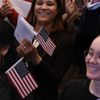Memoirist Bischof pieced together her parents’ past and found her voice
Patricia C. Bischof, as an adult, sat in a room in her mother’s house, crying, as she listened to the story of her mother’s life — a story she had never heard before.
Her mother, Ruth, was being filmed in the next room in an interview, which Bischof had set up, for the Shoah Foundation.
Bischof has spent her life trying to piece together her parents’ past and has spent 10 years writing a book about the experience.
“This interview, I now understand, was a way for her to accomplish her healing is a safe environment and to let people know what the Nazis had done to demolish and totally change her life; it took away her life as she knew it,” Bischof writes in her memoir.
When Steven Spielberg was filming “Schindler’s List,” he heard stories from Holocaust survivors and decided they should be recorded. The Shoah Foundation has recorded the stories of genocide survivors from arond the world.
Neither of Bischof’s parents — her father was a concentration camp survivor — would talk about what had happened to them before coming to the United States.
Bischof’s mother was born in 1910 in the Prussian Empire and became Polish in 1918. Bischof, in her book, describes her mother as a tall, beautiful woman with olive skin and dark hair who spoke a half-dozen languages and sang with a lovely soprano voice.
As a mother, she was strict and made clothes for her daughter that did not show her shape. The family listened to opera on Sundays and the four children — Patricia was the oldest — weren’t allowed to listen to rock and roll.
“Sometimes I just felt lost,” says Bischof in this week’s Enterprise podcast. She didn’t fit in with her classmates at school. “I couldn’t relate. Sometimes even today I can’t even relate, if you really want to know.”
Bischof writes in the introduction to her memoir, “We all need connections to our past.”
She longed for those connections as a child. Her grandparents were all murdered and she had no extended family.
From the Shoah Foundation interview, Bischof learned some of the horrors her mother had endured. Ruth’s quiet upbringing — her family owned a hops business and she lived a sheltered life on their property — was shattered by the Nazis.
Bischof’s grandmother told her mother, as a young woman, that, in America “Everybody smiles; and people don’t work; they just have money.”
Bischof’s grandmother sent Ruth to America on an ocean liner. Just one card reached her daughter from the Warsaw ghetto where Ruth’s mother and brother died.
In New York City, Ruth met and married Henry Bischof, another Jewish refugee from Germany.
Bischof describes her father as cultured and quiet. Born in 1912, he was the son of a middle-class family in Munich.
After he married Ruth and the family settled in the Capital Region, Henry ran a fabric store on Pearl Street in Albany. He died young of a heart attack.
Bischof describes her father as “a kind and refined gentleman” who rarely raised his voice and was usually calm. While her father was most often solemn, she writes that his demeanor would change when he was with his friend, Lou Ismay.
“My father seemed fond of Lou, felt comfortable with him, and Lou liked and respected my father deeply,” Bischof writes in her memoir. “My father seemed at ease and would smile, which was especially unusual. My father would have discussions with Lou that he would not have with others.”
Henry Bischof had been imprisoned at Dachau at the age of 22.
In her Shoah Foundation interview, Ruth had said her husband confided to Louis Ismay about Dachau. The Nazis, on penalty of death, would make the concentration camp prisoners stone other people to death. “They made him beat to death a gay person or a gypsy, [someone in the Nazi hierarchy] even less than a Jew,” Ruth said.
This torture and others had a lasting effect on her husband. “Henry didn’t want any children, no more Jewish children,” said Ruth to the Shoah Foundation interviewer, “but I liked babies.”
They had four: Patricia, James, Rosalie, and Jonathan.
Ruth also said, “I thought I could make Henry alive; I never could.”
Bischof searched to find out more about her father. She describes, in the podcast, the many letters she sent — to Germany, to Israel, to Poland, to various museums and foundations — never knowing what, if anything, would come back in the mail.
She was able to track down her father’s Dachau Concentration Camp number: 8048. And she found an answer she had sought for more than 20 years — why was her father arrested and sent to Dachau?
A document, in German, described him as a Rassenschänder, a race defiler; Bischof pieced together that her father had had a relationship with an Aryan woman.
Bischof doesn’t blame her parents for trying to shield her and her siblings from their horrible experiences. Parents want to protect their children “and they want peace, comfort, and happiness,” she says.
Her parents had their spirits broken but they were survivors, she says.
In her youth, Bischof says, she was often scared. “That’s why I was so introverted. I wouldn’t say anything.”
But now, she says, she has found her voice. She did that by searching for the pieces of her history and putting them together and writing her book.
Her book is called “Memoir of a 2G: Story of Secrecy and Resilience”; “a 2G,” she explains, is a person who had a parent in the Holocaust.
Bischof wrote her book, she says, to answer those who say, “The Holocaust never ocurred.”
“I can tell you,” says Bischof, “it occurred.”
****
“Memoir of a 2G: Story of Secrecy and Resilience” is available through Amazon and Barnes and Noble; the 229-page paperback costs $15.95.



